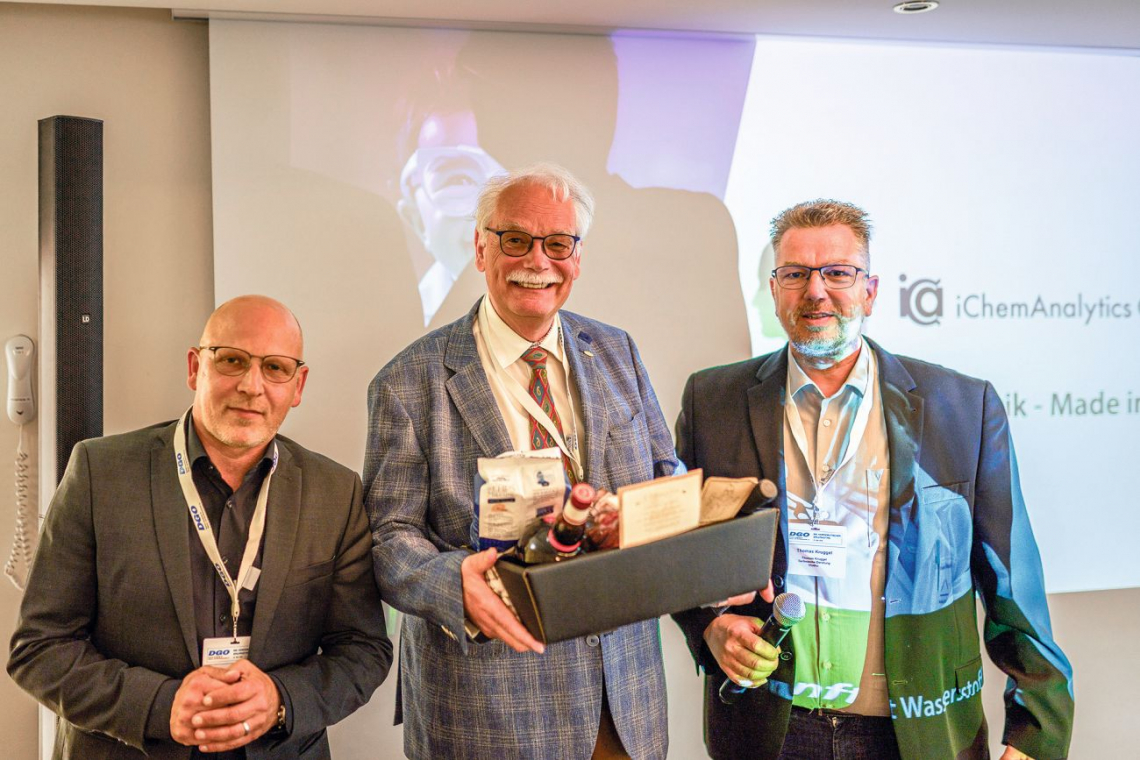The 22nd North German Electroplating Day took place in Altwarmbüchen near Hanover on 23.05.2025. In addition to the almost 70 participants, conference chair Andreas Zahl also welcomed the Technical Managing Director of the DGO, Mr. Daniel Meyer, who opened the symposium with a short greeting from the DGO Board. As Andreas Zahl has retired, the DGO Board has appointed
- Stefan Fließwasser from Montblanc Simplo GmbH in Hamburg as the new district group leader and
- Alexander Spreen from Dr.-Ing. Max Schlötter GmbH in Geislingen an der Steige as Deputy District Group Manager of the DGO Northern District Group.
The conference consisted of the thematic blocks Current developments in electroplating technology, moderated by Thomas Kruggel, and Insights into contract electroplating and standards, moderated by Stefan Fließwasser.
"Efficient, safe and clever temperature control" was the title of the first presentation, given by Christian Gaugigl from Mazurczak GmbH in Schwabach. Important terms such as efficiency, safety and cleverness were defined in the context of temperature control. The effects of insulation, covering and air extraction were also presented. The speaker gave special attention to the topics of fire protection, heat recovery and temperature control of critical process solutions such as concentrated hydrochloric acid and phosphating.
Steffen Genz from Färber & Schmid GmbH in Stuttgart spoke on the subject of "Modern heavy metal precipitants and current methods of wastewater treatment". First, the most common complexing agents in electroplating - cyanides, amines and organic acids - were presented. Building on this, solutions were presented as to how the harmful effects of the individual substances on the wastewater can be removed. Another focus was on the precipitation of trivalent chromium as chromium(III) hydroxide. It was interesting to note that the EU may not ban chromium(VI) after all.
At the end of the first block of lectures, Dietmar Stork from Dr.-Ing. Max Schlötter GmbH & Co. KG in Geislingen an der Steige gave a presentation on "Bright and hard chrome: innovative chromium(III) electrolytes - high-performance and sustainable". The presentation dealt with the transition from chromium(VI) to chromium(III) processes in decorative and functional chrome plating. In addition to waste water treatment, various electrolytes and their properties were presented. There are bright chrome electrolytes, which are free of complexing agents, and hard chrome electrolytes, in which the typical macro-crack formation is suppressed by a greatly reduced incorporation of carbon. This makes nickel-free coatings possible. Using further examples, the speaker showed that considerable improvements have been achieved in metal distribution and therefore also in depth scattering compared to conventional technology.
Joachim Ramisch from Riesmetall GmbH in Nördlingen opened the second block of lectures with his topic "A life for electroplating: The adventures of a contract electroplater". Starting with the German reunification, through the European reorganization to globalization, Riesmetall had to accept a steady erosion of its customer base in the screw industry, which at times supplied up to 80% of its turnover. The measures required as a result were explained:
- Complete repayment of all bank loans
- No new acquisitions, but maintenance and long-term preservation of the existing inventory at a high level
- Dismantling of all components that were only necessary for 3-shift operation
- Extensive automation of all office activities
- Implementation of an effective system for monitoring material and energy consumption
The comments on Riesmetall's vehicle fleet were also interesting. True sustainability is still practiced here.
Finally, Dr. Jens Uwe Riedel from iChemAnalytics GmbH in Detmold spoke on the topic of "Update standardization DIN 50940 Part 2: Determination of the inhibiting effect of pickling inhibitors or hydrogen embrittlement in pre-treatment - an outlook on the new DIN standard 50940 Part 2". The pickling of metals is an essential success factor for the subsequent galvanic coating. Pickling inhibitors slow down metal dissolution and possible hydrogen embrittlement. The presentation showed the limits and possibilities of determining production-related material damage and the effectiveness of different pickling inhibitors. Current work on the new DIN standard 50940 Part 2 is intended to ensure greater application safety for customers and suppliers in the assessment and application of pickling inhibitors, among other things. An overview of the test methods used in the standard was presented and their significance for process monitoring was discussed.


